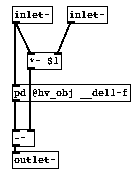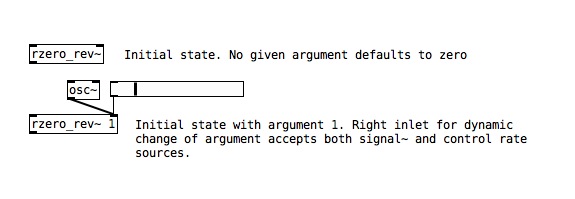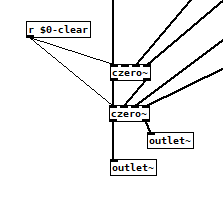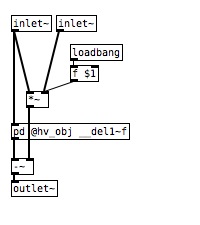Hi, I’ve just recently started using hvcc, so I am in no way an expert, however by looking a little into the documentation (hvcc/12.heavy_lang.md at master · enzienaudio/hvcc · GitHub and hvcc/13.heavy_ir_lang.md at master · enzienaudio/hvcc · GitHub),
it seems to me that the two files in https://github.com/enzienaudio/hvcc/tree/master/core/json:
- heavy.ir.json
- heavy.lang.json
should contain a list of all supported objects.
Looking a little more in the source code I found in hvcc/utils/hvutils.py which if copied in hvcc/ can be executed:
$ python hvutils.py pdobjects
which returns this list (sorted by me)
[’!=’, ‘%’, ‘&’, ‘&&’, ‘’, '~’, ‘+’, ‘+~’, ‘-’, ‘-~’, ‘/’, ‘/~’, ‘<’, ‘<<’, ‘<=’, ‘==’, ‘>’, ‘>=’, ‘>>’, ‘abs’, ‘abs~’, ‘adc~’, ‘atan’, ‘atan2’, ‘b’, ‘bang’, ‘bendin’, ‘bendout’, ‘biquad~’, ‘bng’, ‘bp~’, ‘catch~’, ‘change’, ‘clip’, ‘clip~’, ‘cnv’, ‘cos’, ‘cos~’, ‘cpole~’, ‘ctlin’, ‘ctlout’, ‘czero_rev~’, ‘czero~’, ‘dac~’, ‘dbtopow’, ‘dbtopow~’, ‘dbtorms’, ‘dbtorms~’, ‘declare’, ‘del’, ‘delay’, ‘delread~’, ‘delwrite~’, ‘div’, ‘env~’, ‘exp’, ‘exp~’, ‘f’, ‘float’, ‘floatatom’, ‘ftom’, ‘ftom~’, ‘hip~’, ‘hradio’, ‘hsl’, ‘i’, ‘inlet’, ‘inlet~’, ‘int’, ‘line’, ‘line~’, ‘loadbang’, ‘log’, ‘lop~’, ‘makenote’, ‘max’, ‘max~’, ‘metro’, ‘min’, ‘min~’, ‘mod’, ‘moses’, ‘mtof’, ‘mtof~’, ‘nbx’, ‘noise~’, ‘notein’, ‘noteout’, ‘osc~’, ‘outlet’, ‘outlet~’, ‘pack’, ‘pgmin’, ‘pgmout’, ‘phasor~’, ‘pipe’, ‘poly’, ‘pow’, ‘powtodb’, ‘powtodb~’, ‘pow~’, ‘print’, ‘q8_rsqrt~’, ‘q8_sqrt~’, ‘r’, ‘random’, ‘receive’, ‘receive~’, ‘rmstodb’, ‘rmstodb~’, ‘route’, ‘rpole~’, ‘rsqrt~’, ‘rzero_rev~’, ‘rzero~’, ‘r~’, ‘s’, ‘samphold~’, ‘samplerate~’, ‘sel’, ‘select’, ‘send’, ‘send~’, ‘sig~’, ‘sin’, ‘snapshot~’, ‘spigot’, ‘sqrt’, ‘sqrt~’, ‘swap’, ‘symbol’, ‘symbolatom’, ‘s~’, ‘t’, ‘table’, ‘tabosc4~’, ‘tabplay~’, ‘tabread’, ‘tabread4~’, ‘tabread~’, ‘tabwrite’, ‘tabwrite~’, ‘tan’, ‘tgl’, ‘throw~’, ‘timer’, ‘touchin’, ‘touchout’, ‘trigger’, ‘unpack’, ‘until’, ‘vcf~’, ‘vd~’, ‘vradio’, ‘vsl’, ‘wrap’, ‘wrap~’, ‘|’, ‘||’]




